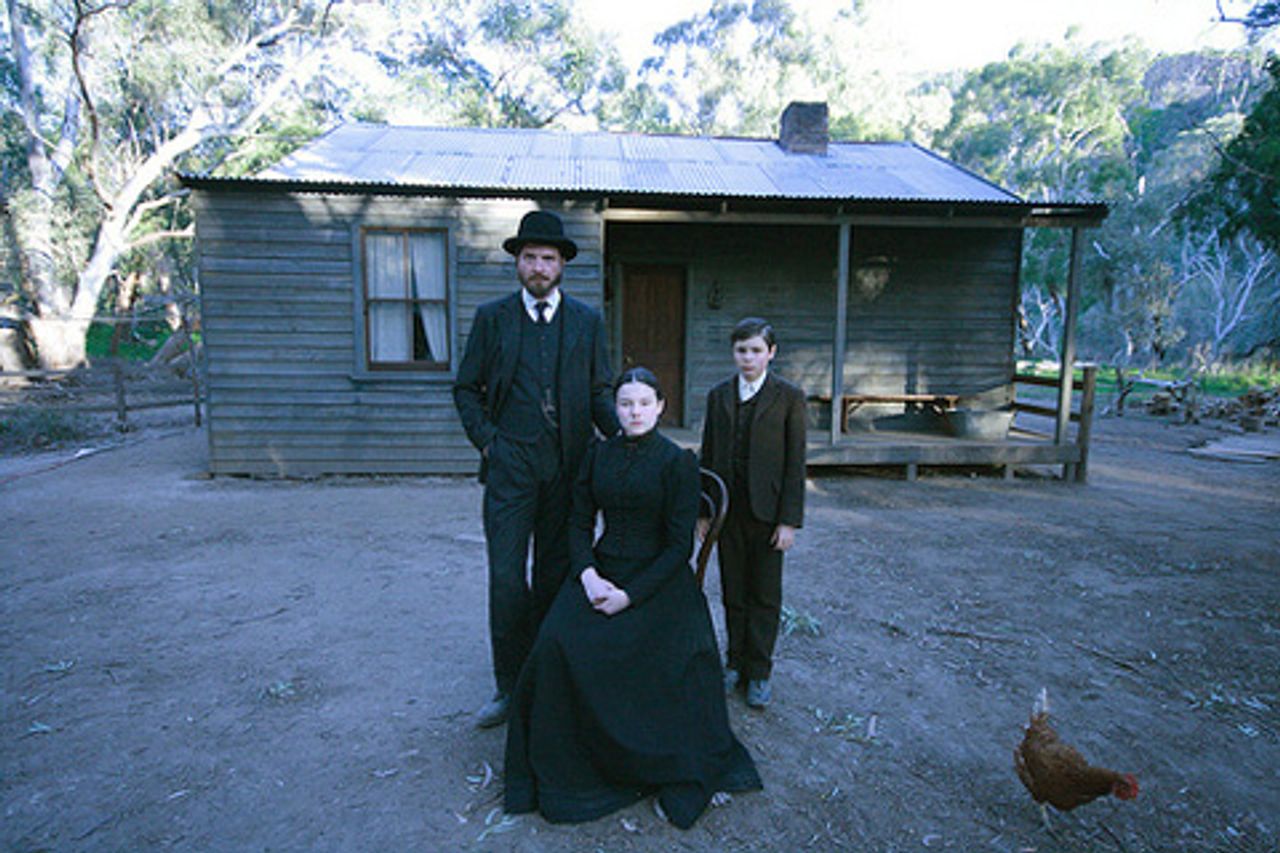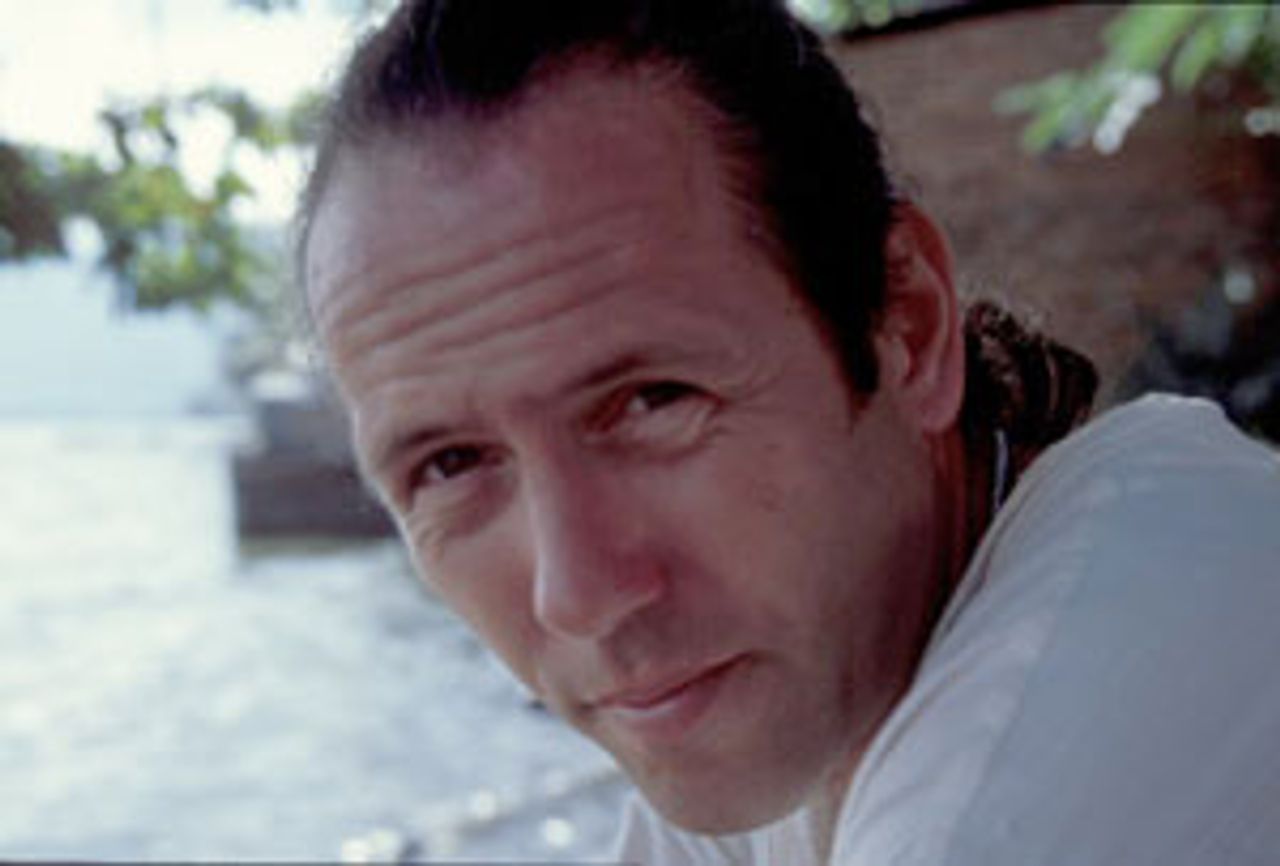 Lucky Country
Lucky CountryIn January the World Socialist Web Site reviewed several low-budget Australian movies released last year and now available on DVD (see: “Four Australian movies—Van Diemen’s Land, Beautiful Kate, Last Ride and Lucky Country”).
Lucky Country, which is directed by Kriv Stenders and set in 1902, just after Australian federation, is about a small farmer and his family struggling to survive on their isolated, dirt-poor property. While the newly-founded nation proclaimed freedom and equal opportunity for all, life for the family is grim. It worsens after they provide temporary shelter to three former Boer War soldiers.
The WSWS recently spoke with Lucky Country scriptwriter Andy Cox, who explained some of the film’s themes. Cox has worked as a writer, editor and script consultant in theatre, feature film and documentaries in the UK, US, Europe and Southeast Asia. He also commented on increasing demands by local critics and media commentators that Australian filmmakers should be animated by commercial considerations.
Former Sydney Film Festival director Lynden Barber, for example, suggested last year that filmmakers needed to produce “more corn, more hype, more Australiana; boatloads of escapism and showbiz”. Screen Producers of Australia Association president Antony Ginnane told a producers’ conference that filmmakers’ “ability to read the markets” was being “dulled by the [government] subsidy drug”. “This is a business. It’s not about art,” he declared.
I began my discussion with Cox by asking how the idea for Lucky Country had emerged.
 Andy Cox
Andy CoxAndy Cox: It came out of a camping trip to northern New South Wales when I stumbled on an old settler’s cabin. I’d been trying to write a story about the appropriation of national myths in the here-and-now, but it wasn’t working. After I came across the old cabin I began thinking that if I set my story in 1902 and placed my audience in a different cinematic and genre space, then the ideas I wanted to explore might emerge more powerfully.
I did some research and read some speeches by politicians from that period and lo and behold all their arguments about so-called Australian values were the same as the political commentators today. It was fascinating that so little had changed. So I set the story in 1902, just after federation and a period of great distress, a time when there were a lot of grim things going on in Australia.
Richard Phillips: What particular issues did you want to explore?
AC: What it meant to be an Australian and things like mateship and the fair-go. I wanted to probe these myths, which have been transformed into truths so sacred that it’s almost taboo to question them today. Mateship and the fair-go, of course, are not specifically Australian phenomenon but commonplace values—human values, in fact.
RP: That’s right. What precipitated this examination?
A couple of years ago [Australian model] Jennifer Hawkins was on a catwalk and her dress fell off. All she was wearing was a thong and so she grabbed her bum, giggled, and ran off the catwalk. One television commentator declared that Hawkins’ response was “quintessentially Australian”. It was ridiculous. Why was this response supposed to be “quintessentially Australian”? What does it mean and what’s it for?
The more I thought about it, the more I realised that there’s an obsession by politicians and the media who try to define Australia or Australians in these sorts of terms. But once you start questioning these phrases they fall apart very quickly.
I wanted to look at these things without making a specific statement and see if they could percolate some of these issues through the movie. And judging by the some of the right-wing responses to the film, I must have succeeded on some sort of level.
RP: What were these reactions?
AC: The initial response was good. Everyone praised the screenplay, even those that didn’t like film itself, but then about 10 days before the official release it changed—the writer was wrong, the script was terrible and so on. Several critics were quite blatant, claiming that Australia was no longer the sort of country depicted in Lucky Country and that we didn’t need to ask ourselves these sorts of questions. It was like being reviewed by [Liberal Party leader] Tony Abbott or [former prime minister] John Howard.
I was born in England but I’m a proud Australian citizen and this is my home. It’s one of the reasons I was writing and questioning these things. I believe that if you have a relationship—whether a personal one or with a place—it’s important to always reinvent, recreate and re-imagine it. If you don’t, then the relationship goes stale. But the agenda behind some of the critical responses to Lucky Country was to keep that relationship stale.
RP: Why do you think there was such a response?
AC: I don’t know but I found it really curious and unfortunately symptomatic. This unwillingness, this fear of turning the light on oneself, is worrisome. And yet this is what stories should really be about. They should be tools to challenge us to observe and to question.
RP: Nationalism is on the rise internationally. Do you see any connection in some of critical responses to Lucky Country?
AC: I’d be disinclined to use the word nationalism but there is a fear of breaking taboos. But why is it so wrong to question national myths, why is it a taboo? And if it is becoming stronger, and it seems to be, then it’s a real cause for concern. In this day and age any notion of having self-protected enclaves is absurd.
RP: Can we discuss the comments of some critics and industry figures like Antony Ginnane that Australian filmmakers have to learn to “read the market”? We quoted some of their remarks in our review.
AC: I understand Ginnane’s point of view—he’s interested in producing genre flicks and makes a lot of money from them—but there’s another agenda there. There were similar comments from Louis Nowra [Australian playwright]. Their approach is that if it’s not black, then it must be white.
The problem, they say, is there’s not enough money being made out of local movies and this has to change.
The financial imperative and commercial pressures on filmmakers are obvious but these voices of dissent miss the point entirely. Independent pictures are not going to be overnight box office successes.
You don’t pick up your newspaper and have commentators talking about the fact that the government gives subsidies to olive growers, and yet it takes 15 years for olive trees to bear fruit. It should be the same for the filmmakers.
Take the Coen brothers, for example. They hardly make any more money at the box office here than Australian movies and yet they are lauded by people like Ginnane as being great. Coen brothers’ movies have a longer tail on them, which is over five or ten years, and then they break even.
The countries that seem to have it right have three or four tent-pole films a year and the rest are widely varied. It’s no good just doing remakes of the Tooth Fairy, even though that’s valid in its own right as a money-making tool. You need something else. And it’s this “something else” that’s important.
The way our critics layer their argument over the entire swathe of cinematic experiences is fallacious and won’t solve anything. The real issue is generating a strong film culture and I strongly believe that the startling output of films from Australia in the past year—from genre flicks to melodramas, gritty thrillers, comedies, romances—was remarkable.
The interesting thing about Avatar is how widely it has appealed, and not just for its special effects. It may be glib, derivative storytelling but it’s also very simple and effective. The Dongria Kordh tribe in Eastern India have been battling the British mining firm Vedanta with bows and arrows over the company’s intention to build a bauxite mine on their sacred land. Due to Avatar’s broad appeal as a story and its subsequent wide global reach, the tribe have now taken it upon themselves to promote their cause via the film and it’s already having more effects than any of their tactics thus far.
Ginnane is correct in one way in that there is a prevalence of social realism in Australian cinema. There’s a tendency to call a spade a spade in this country. In cinema the most effective and powerful story conceits do the opposite. They are Cocteau’s “beautiful lie that tells the truth” and this is where clever and inventive use of genre is vital in cinema if it’s to have wide appeal.
RP: If filmmakers are entirely driven by commercial considerations and “reading the market” then their work is inevitably superficial and unconvincing. These pressures, of course, are not specifically Australian problems.
AC: No, they’re not but there has to be a different approach and there’s something of this in Britain. Recent films by Lynne Ramsay, Andrea Arnold and Pavel Pavlovsky have bombed at the box office but the British press didn’t turn on the filmmakers.
The British Film Council realised that there could be people like Tony Ginnane and other like-minded types declaring, “We can’t do these sorts of films anymore because they’re not financially successful”. The Film Council, in fact, decided to put aside $15 million just for artists to make films and they did this in order to stop the industry becoming risk averse. Here, by contrast, the commentators want the industry to be risk averse.
Certain people like [Australian writer/director] Paul Cox and others will find a way to keep making films, even though not many people will see their work. I think it’s important to get as wide an audience as possible and to do that you have to pay attention to the traditional elements of making drama work and using genre in a creative and inventive way, rather than in an exploitative way.
I’m probably going off at a tangent here but there’s a big future for filmmakers getting audiences through television, which provides an incredible opportunity for long-form narrative if you’re inventive and don’t treat audiences like idiots. People want to watch things that are challenging and questioning—look at the audiences for television drama—but Australian broadcasters are very conservative and haven’t cottoned on to this yet.
A lot of people whinge about the Australian film industry but I’ve worked in the industry in the US and the UK, and the moaning doesn’t fit in with my personal experiences here. There are great professionals and very talented filmmakers and storytellers working across the whole spectrum in Australia—from Happy Feet to Samson and Delilah. What’s important is the establishment of a structure that can pull all that talent together and embrace it.
At the end of the day, what’s needed is an industry that is demonstrably reflective of society as a whole. Society has to be able to read itself from what it creates. This is necessary and important because it encourages society to become self-reflective and more thoughtful about itself.
